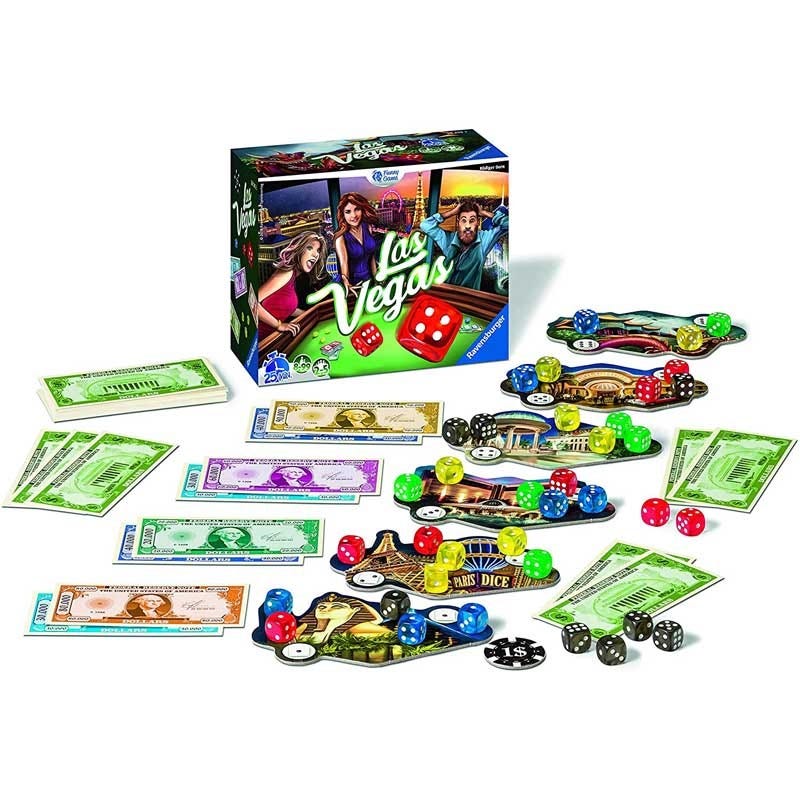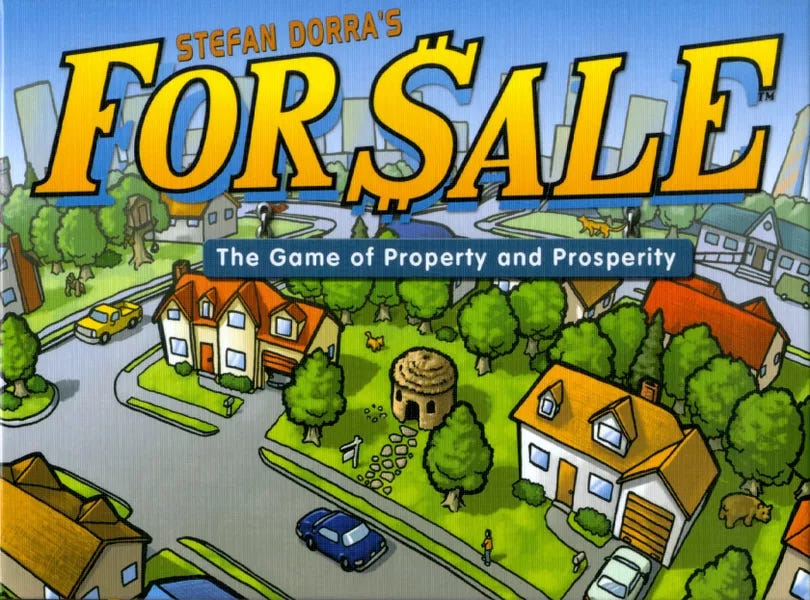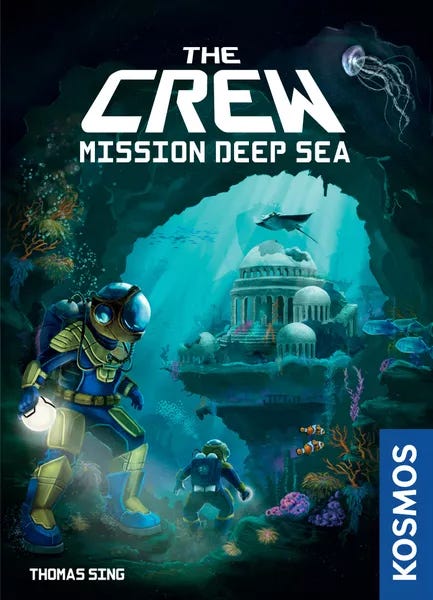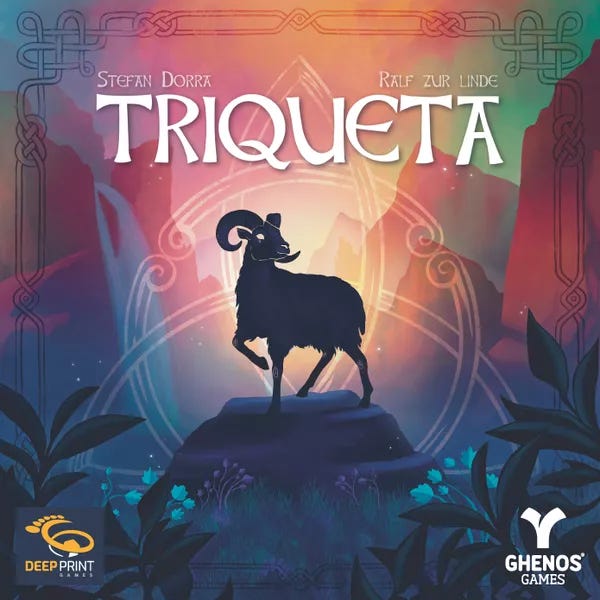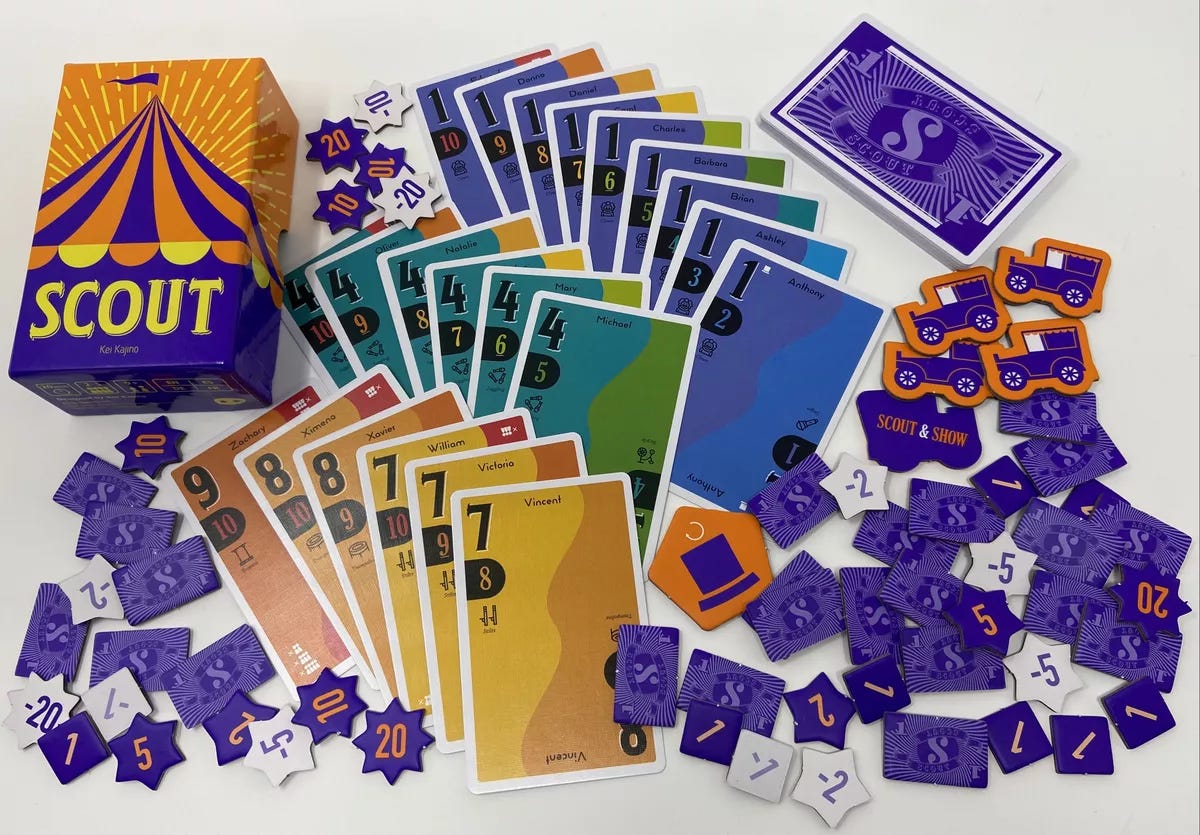Six Great Summer Games
Suggestions for board and card games that are light and easy to get to the table, but still smart and fun.
I’m not above sitting a friend down and spending 40 minutes teaching them a heavily thematic board game, watching the life drain from their eyes as I explain that the extraction action is limited by your cache of energy cubes, which apply to primary but not secondary resource actions. But it’s the summer.
Lately I’ve been playing breezy games that you can finish in ~20 minutes. Games that are easy to bring out and ideally fit in your pocket. Games that anyone can quickly learn and enjoy.
Here’s a half-dozen games I’ve been frequently reaching for over the past couple months. They’re different styles - dice rolling, auctions, trick-taking, cooperative, bluffing, tile laying - but all of these games are easy to learn, speedy to play, and are reliable crowd-pleasers.
Las Vegas
Steal fake money from your friends
(Let me first caveat that this game is hard to find. The English version has been replaced with the bigger, clunkier Las Vegas Royale but you can still find non-English versions around. In particular if you’re in Canada you can likely order a French copy from a games store in Quebec. It’s a dice game with no writing so there is nothing to lose in translation.)
Las Vegas is as light as it gets. You take turns rolling a bunch of dice, placing them on different Las Vegas casinos, and then collecting money from any casino where you’ve got the most dice. Sometimes you go all in on a bidding war over a big jackpot, other times you may spread your bankroll around to take multiple bites of smaller pots.
The catch is that when two players have the same number of dice at one casino they cancel out and count as zero. So whenever you’re in a bidding war there’s a chance it will end in you both going bust, which incentivizes speculators to swoop in with their own dice to try to steal the winnings for cheap. But fundamentally you’re rolling and placing dice, making Las Vegas great as a family game, an end-of-night closer, or an on-ramp for people who don’t normally play games.
Player count: two-to-five players and the more the better.
For Sale
What’s more escapist than buying multiple properties?
The only problem with this 27-year-old game is the modern implication that if you’re speculatively buying up a series of homes you must be playing as a private equity firm. For Sale is a quick game that mashes together two bidding mechanics. In the first phase you spend your cash auction-style to bid on a series of properties ranking in value from the likes of an outhouse to a castle. In the second phase you use your properties to blind bid on pots of money. The player with the most money at the end wins.
For Sale has a nice rhythm. The more skillful you are at bidding for properties, the stronger your bids will be when you’re cashing out. There are deeper auction games out there (I like Furnace and Ra) but we keep returning to this one because it plays lightning quick and can be taught in, like, two minutes. Plus if you get the travel edition it’s the size of a deck of cards.
Player count: Scales very well from three-to-five players.
Skull
A game of poker face without the poker
Technically you could make this game yourself with a pen and a handful of bar coasters, but I like the art of the retail edition. Skull is a bluffing game where you flip over coasters put down by opposing players to reveal either a flower - you win - or a skull - you lose.
There’s a bit more to it and some strategy to when to place your skull coaster, but mostly this is a pure game of looking your opponent in the eye and trying to read whether they’re lying. Every game I’ve played has led to laughing and shouting, making it a good game for a patio or beer garden.
Player count: It technically plays three-to-six but this is one where you want a higher player count. You can also get an expansion for up to eight players.
The Crew: Mission Deep Sea
Get by with a little help from your friends
Cooperative games tend to be heavy affairs, but The Crew series is light on its feet. It follows the standard trick-taking framework but each mission will give players their own challenges to meet. Player A might have to win the first three tricks, while player B needs to win the most cards in the green suit, while player C needs to not win a single yellow card. You’ve got to work together to make sure every goal is accomplished, or you all lose.
But you can’t actually say what cards are in your hand or what you want anyone else to play. Instead, the fun of The Crew comes from trying to coordinate through card plays and some limited commmunication tools. Play with the same group a few times and you can get in sync and perfectly execute a winning series of tricks. It’s very satisfying. Or you can misread your partner’s someone else win this play as let me win this one and it all ends in disaster. But failure in this game doesn’t feel too bad. You just draw some new challenges (adjusted to your preferred difficulty level) and jump right back in.
Player count: Three-to-five players. The mission difficulties are scaled for different player counts, which makes the game work well at any number.
Triqueta
Collect animals, but not that many animals
Cascadia and Azul are popular tile-laying games partly because there’s something soothing about placing clay or wooden tiles on bright, multicolored landscapes. Triqueta induces that same little burst of tactile satisfaction while being an even lighter, quicker experience.
On your turn you can either reveal a new animal tile to add to a stack, or take all the revealed animals in one stack of your choice. Your goal is to collect three-of-a-kind sets of animals, which give you points. The problem is if you collect more than three of an animal type then your points are wiped out.
This creates a push-your-luck tension where you want to grab more tiles than your opponents to win more points, but if you get too greedy it can all blow up in your face. Say you pick up three deer early early in the game. From then on, every new deer revealed is essentially a bomb, a poison pill that other players can (and will) place in a stack to mess with you. It can be a sneakily cutthroat game but it never feels too mean because you’re taken by how satisfying it is to arrange these clay tokens with slick art design.
Player count: The box says two-to-five, including a two-player variant with alternate rules. This is a rare game that I find plays better at three players than four because the risk of going bust is higher. I have not played with five players and have a hard time seeing how that would work as well.
Scout
A modern classic with a nonsensical theme
This game has been a revalation. It came out just a few years ago but with its clever reworking of a classic formula it feels like something you’ve been playing your whole life.
If you grew up playing long rounds of Asshole you’ll already have a good feel for it. In Scout players take turns putting down ever-higher sets of cards until someone is out of cards or plays a set no one can beat. The larger the combo the better: a run of four cards would beat a three-of-a-kind, which would beat a pair, which would beat a high card.
Two rules define Scout. One is that unlike most of these type of games you can’t rearrange your cards, they’ve got to stay in the order they were dealt. Two is that on your turn instead of playing down cards you can pick up one that’s been previously played and add it to your hand anywhere you like. This is how you manipulate your deck and set up future combos. Picking up a lowly 1 card can be a smart play if it lets you create a set of three 1s in a row.
This system offers up an endless string of crunchy choices. Playing cards is good - the whole point is to empty your hand. But picking up cards lets you craft your deck to bring down the hammer later. But if you spend too much time setting up a huge combo someone may play all their cards and end the round before you’re ready. A typical turn is mulling do I play my two 9s now or do I pick up that 5 because I might be able to string together a 3-4-5-6-7 combo in a couple turns?
It’s highly tactical but the game moves so fast and is so interactive that you fly through rounds. It’s like if Go Fish had the decision-making space of chess.
Player count: Scout is fantastic with four or five players. It still works with three but it feels unbalanced because it’s so easy to lay down a combo of cards that no one can beat. Also, the game has a baffling circus theme that adds nothing and has no impact except the first time someone plays it they’ll ask “why does this card have the name ‘Paul’ and a tiny picture of a unicycle?” I tell them to just ignore it.




